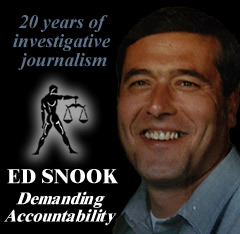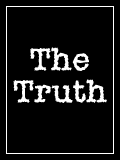Other
Snook
Articles:
Coming Soon
IRS "CON"SPIRACY CHARGE IN MONTANA
PART 1 of 2
by Edward Snook with R.S. Errol
July 23, 2007
NewsWithViews.com
Billings, Montana � Henry (Hank) and Judy Matthies of Laurel, Montana were served superceding indictments on April 25, 2007, by U.S. Attorney Kurt G. Alme. The indictments charged Hank with two counts of �Willful Failure to File Income Tax Returns� for years 2000 and 2001 and both Hank and Judy with �Conspiracy to Defraud the United States� for the purpose of impeding, impairing, obstructing, and defeating the lawful government function of the Internal Revenue Service of the Treasury Department (IRS) in the ascertainment, computation, assessment, and collection of the revenue; that is, income taxes.
It is highly unusual to be served a superceding indictment without being served with the original indictment, which was sealed until the Matthies were arraigned on June 21, 2007. The original indictment charged Hank with 2 counts of �Willful Failure to File Income Tax Returns� for years 2000 and 2001. The IRS maneuvered to ensure the original indictment was handed down by the Grand Jury before the statute of limitations expired, for the year 2000, on tax day of 2007.
Conspiracy to Defraud is a Con
Attorney Jeff Dickstein so eloquently stated in his closing arguments in the now infamous �Joe Banister� trial � �A conspiracy to defraud is a con. You defraud someone when you convince them that what you absolutely know isn�t true is in fact true. You would have to trick them into believing what you know to be false is true. Trickery, deceit and craft. To conspire to defraud the United States means to directly interfere with or obstruct one of its lawful government functions. The purpose of a conspiracy is to defeat by misrepresentation, chicanery or to overreach those charged with carrying out the government functions.�
A close investigation into the Matthies� history and belief system, something the government didn�t take the time to do, verifies that their actions were a matter of public record; therefore the government�s charges on conspiracy are ludicrous at best. Who�s conning who?
Objects of the Conspiracy
The indictment claims that Hank and his employer overstated the number of allowances to which he was entitled. Let�s dwell on this allegation for a moment. Hank Matthies did not overstate the number of allowances on the W-4 submission since according to the internal revenue code he could lawfully claim up to 9 allowances. Since allowances are not defined as dependents Hank was merely reducing the amount of withholding tax, which tax he knows is unconstitutionally applied to him, from his paycheck. It should be noted that in order for Hank to get a job he had to fill out a W-4. Most employers across this country are unaware that filling out a W-4 is voluntary according to the tax code; therefore they require a person to fill this out before they will hire them. Hank has always written �under duress� on the W-4 and he crossed out the statement �under penalty of perjury,� due to his insistence with being honest with himself and others. At anytime the IRS could have instructed both Hank and his employer to reduce the allowances administratively. He worked for the same employer for over ten years and not once did the IRS attempt to mandate a change in W-4 allowances. Who�s conning who?
Furthermore, the IRS claims that in order to conceal assets from government the Matthies� transferred assets to trusts and held title to assets in trusts and in Mrs. Matthies name. They also claimed that the Matthies� impeded and obstructed the IRS from determining and collecting the amount of income tax Hank allegedly owed them and the IRS claims these transfers were meant to create barriers from collection efforts and exempt income from tax. Let financial planners take note of these purported illegal activities.
The Matthies� like most concerned families discussed the need for a trust in order to avoid the ravages of probate. In 1997, Hank told Judy to get the ball rolling on the trust and she did. The property deed in the trust�s name was filed with the County Clerk and Recorders office in accordance with the law. No trick, deceit or craftiness there. Since it was public record and if the IRS wanted to break the trust in order to collect what they say he owes, they certainly could have done that just as they illegally do thousands of times across the country every year. This writer is not aware of any law that forbids property to be held in trusts, in fact most prudent Americans use trusts to ensure that they leave an inheritance protected for the beneficiary when they decease. Who�s conning who?
The IRS claims that Hank filed income tax returns and amended returns reporting no income or deductions in order to conceal and mislead the IRS as to their actual income and deductions. This charge is preposterous since Hank filed the returns along with applicable affidavits citing U.S. Supreme Court cases he relied on to prove he wasn�t liable to pay a tax on income. If the IRS is stating that he filed these returns how is it possible that they are charging him with willful failure to file? Who�s conning who?
Additional charges state that in order to conceal income from the IRS, Judy Matthies would cash Hank�s payroll checks instead of depositing them in a bank account. The Matthies� like so many other law abiding citizens declined to use a checking account due to an unpleasant experience with their banking institution thirty years ago. After being notified of an over drafted check and subsequent bank charge that was proven to be incorrect, Hank elected to deal in cash and live within their means. One would assume that there is still enough �freedom� left in this country to afford the Matthies� this right. Hank and Judy Matthies are deeply religious people who firmly believe that their Creator has instructed them to be good stewards of that which their Creator provides them.
In order to facilitate check cashing the Matthies� still have a savings account, solely for the purpose of operating in commerce. It is clear that any check cashed by a bank is set into a permanent record of the transaction. The savings account always had an adequate balance the IRS could attach at whim. They never levied this account but have the audacity to charge the Matthies� for cashing checks. Due to this bank record how is it that they are being charged with concealing income? What law forbids citizens the right to cash checks? Think of all the payroll check cashing facilities across this country. Are these institutions conspiring against the government as well? The con in this case is trying to make people believe the Matthies� are doing an illegal act when the act is totally benign � totally legal.
Overt Acts
The overt acts must demonstrate that there were, in fact, criminal agreements between the Matthies� and other known and unknown co-conspirators. Hank is charged with claiming nine allowances on the W-4. Where is the criminal agreement between him and his employer? The withholding form was completed, submitted to and accepted by his employer. Never was there an issue raised between Hank and the IRS regarding this submission.
The IRS further states that Judy purchased a 1994 truck with Hank�s earned income and applied with the State of Montana for title in her name. Subsequently, Hank submitted a statement to the Montana Department of Justice, Motor Vehicles Division, that he had no interest in the 1994 truck. This act was motivated by the Matthies� in an effort to establish credit in Judy�s name in case of the untimely death of her spouse. This transaction is replicated by American families time and time again. All vehicle registrations are a public record sanitized with sunlight, with no hint of conspiratorial intent. Yet the con-artists continue the facade of flimsy charges against this hard working family.
Not stopping there the IRS stated that Judy transferred the truck to a trust, which she did indeed do after the trust was created. People transfer vehicles into trusts for many legitimate reasons, one of which is protecting themselves from lawsuits. She in turn purchased another vehicle which was titled in her name for the sole purpose of maintaining her personal credit rating. Is this totally legal transaction that is of public record a conspiracy? Again, who�s conning who?
Continuing the slate of charges, Judy is accused of transferring their house into a couple of trusts over a four year period of time. There is no intent or criminal agreement to conspire with anyone about their personal business as all of these actions are public record. Maybe the Clerk and Recorder who filed these documents is part of the purported conspiracy. How absurd!
|
Subscribe to the NewsWithViews Daily News Alerts! |
The IRS then states that Judy paid the property taxes owed on the house that the trust owned. This is true, because the trust did not have a bank account and it was Judy�s responsibility to pay the taxes. There�s still no criminal agreement with anyone. It�s called financial responsibilities. For part two click below.
Click
here for part ------> 2,
� 2007 - Edward Snook - All Rights Reserved
Sign Up For Free E-Mail Alerts
E-Mails
are used strictly for NWVs alerts, not for sale
Edward Snook is 20-plus year investigative journalist, with a college major in criminal justice and the publisher of US-Obsrver newspaper.
E-Mail: ed@usobserver.com
Website: usobserver.com
Attorney Jeff Dickstein so eloquently stated in his closing arguments in the now infamous �Joe Banister� trial � �A conspiracy to defraud is a con. You defraud someone when you convince them that what you absolutely know isn�t true is in fact true.











